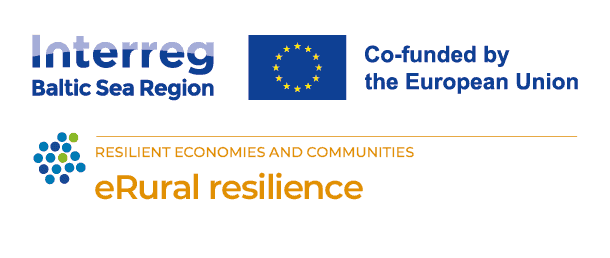
Case-study of testing the Methodology for Assessment of e-bio-business supporters at Järvi-Pohjanmaan Yrityspalvelu Oy. Interview with Liisa Kuoppala.
19 March 2025
In autumn 2024, Järvi-Pohjanmaan Yrityspalvelu Oy (JPYP) embarked on an important initiative to assess and enhance its staff’s competencies through the Competence Profile Assessment, as part of the eRural resilience project. The skill needs analysis is part of the project’s Solution 1 – Methodology for Assessment of e-biobusiness supporters.
To gain insight into the process and its impact, we spoke with Liisa Kuoppala, the project manager of eRural resilience at JPYP.

Understanding JPYP’s Role in the eRural Project
“JPYP has long been committed to fostering business growth and innovation in eastern South Ostrobothnia,” Liisa begins. “Within eRural, we focus on supporting entrepreneurs, guiding startups, and facilitating ownership transitions. This project is a great opportunity for international Interreg cooperation to share expertise, to refine our capabilities and ensure we offer the best support possible.”
Why Support Bio-Businesses in Rural Areas?
Liisa explains that bio-businesses play a crucial role in rural development. “Diversifying the economy is essential. Bio-businesses bring new industries, reduce reliance on traditional sectors, and create jobs,” she says. “Plus, sustainability is key—we promote renewable resources and environmental responsibility.”
JPYP actively supports bio-businesses by providing tailored advice, networking opportunities, and development initiatives. “We want to make sure these businesses thrive, and that’s why assessing our own competencies is so important,” Liisa adds.
Assessing Competence: The Why and How
The Competence Profile Assessment was designed to evaluate JPYP’s expertise in bio-business support. “It’s about identifying skill gaps and setting a benchmark for where we stand,” Liisa explains. “With this structured methodology, we can ensure a consistent evaluation process and make informed strategic decisions.”
Piloting the Competence Profile Assessment at JPYP
“We started in autumn 2024 by informing staff about the assessment and its goals,” Liisa recounts. “Some needed translation assistance, which we provided. The interview with the CEO and the digital competence assessment were conducted by an external party, which also provided questionnaires to the staff, followed by an additional survey to validate the findings.
The collected data provided a comprehensive overview of strengths and areas needing development. “The process was enlightening,” she says. “It really helped us see where we excel and where we should focus our efforts.” And what is important to mention, the methodology for assessment was designed thanks to international Interreg cooperation.
Key Findings and Their Impact
The results were both encouraging and insightful:
- Enhanced Self-Awareness: “We all gained a clearer understanding of our competencies,” Liisa notes. “This awareness fosters continuous improvement.”
- Customized Training Plans: “Based on our results, we received tailored recommendations for training videos to strengthen key skills.”
- Improved Service Delivery: “With a more targeted approach, we can better support bio-businesses in the region.”
Next Steps for JPYP
“This is just the beginning,” Liisa states. “Moving forward, we’ll implement the recommended training plans and encourage collaboration among staff to maximize our strengths.”
Does the Methodology Work?
“Absolutely,” Liisa affirms. “The structured approach made it easy to assess competencies, pinpoint development areas, and plan strategically. This methodology is a valuable tool for any organization looking to enhance its bio-business support.”
The Broader Impact of Competence Assessment
Liisa believes that when Business Support Organizations (BSOs) adopt this methodology, developed under the international Interreg cooperation, benefits extend beyond individual organizations:
- Higher-Quality Support: “BSOs can provide more specialized assistance to bio-businesses.”
- Stronger Networks: “Standardized assessments promote collaboration and knowledge exchange.”
- Regional Development: “Better support means more sustainable businesses, job creation, and economic growth.”
International Value and Sustainability
“What’s great about this methodology is its scalability,” Liisa highlights. “It can be adapted across regions and organizations, ensuring long-term improvements in business support.”
Reflecting on the project’s impact, Liisa concludes: “We’ve taken an important step forward. By continuously developing our competencies, we strengthen not just JPYP but also the entire bio-business ecosystem.”






